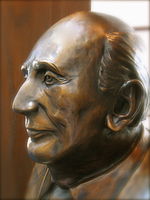Bob Jones, Jr.
| Bob Jones Jr. | |
|---|---|
 |
|
| 2nd President of Bob Jones University |
|
|
In office 1947–1971 |
|
| Preceded by | Bob Jones Sr. |
| Succeeded by | Bob Jones III |
| Personal details | |
| Born |
Robert Reynolds Jones Jr. October 19, 1911 Montgomery, Alabama |
| Died | November 12, 1997 (aged 86) Greenville, South Carolina |
| Spouse(s) | Fannie May Holmes |
| Children | 3, including Bob Jones III |
| Alma mater |
Starke's University School University of Pittsburgh University of Chicago Northwestern University |
| Profession | college president, actor, art collector |
Robert Reynolds "Bob" Jones Jr. (October 19, 1911 – November 12, 1997) was the second president and chancellor of Bob Jones University. Born in Montgomery, Alabama, Jones was the son of Bob Jones Sr., the university's founder. He served as president from 1947 to 1971 and then as chancellor until his death.
Educated by tutors and at Starke's University School in Montgomery, Jones was a voracious reader who tackled everything from Tom Swift and Tarzan to Walter Scott and Foxe's Book of Martyrs. As a ten-year-old, his father gave him 50 missionary biographies for Christmas—which the boy finished by February.
After graduating from Bob Jones College in 1931, when he was nineteen, Jones earned a master's degree in history at the University of Pittsburgh (1933) and did further graduate work at the University of Chicago Divinity School and Northwestern University. Jones was often called "Dr. Bob Jr." during his lifetime—he disliked the "Jr."—but his doctorates were honorary, the first conferred by Asbury College in 1934, when he was only twenty-three.
As a young man Jones became an accomplished Shakespearean actor and studied at Stratford-upon-Avon. He considered turning professional and even received an offer from Hollywood—thereby causing some anxious moments for his evangelist father. Jones Jr. did create a one-man show he called "Curtain Calls", in which he portrayed seven or eight Shakespearean characters accompanied by classical music, scheduling performances four weeks a year from 1933 to 1945.
Jones believed that his primary calling was helping his father administer Bob Jones College. Administration per se seems to have held little interest for him; at least his autobiography contains virtually no mention of his college presidency. Nevertheless, Jones seems to have directed the school more autocratically after 1953, when the assistant of Bob Jones Sr., Theodore Mercer, was fired, allegedly for trying to lead a faculty rebellion against the Joneses.
...
Wikipedia
